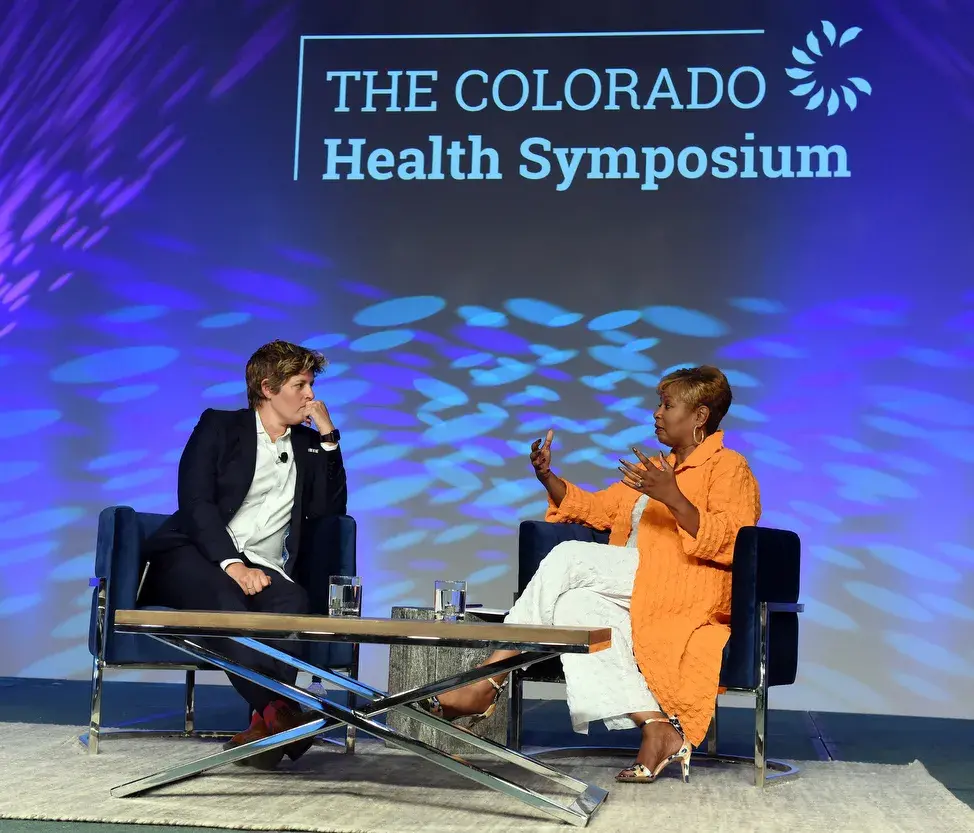Reporting live from the 2017 Colorado Health Symposium, Michael Booth, health care and policy writer and guest blogger for the Colorado Health Foundation, will summarize daily insights and synthesize the conversation about one of the most complex social issues of our time – inequity.
The 2017 Colorado Health Symposium began with a key mantra of getting inequity on the table and addressing what it takes for civil, bold discourse. And of course, how it affects health.
Colorado Health Foundation President and CEO Karen McNeil-Miller welcomed the crowd to the three-day annual conference with an emphasis on how the Foundation is changing the way they tackle issues – starting with their vision as an organization. Rather than adopt a singular aspirational goal, the Foundation Board and leadership adopted a new vision to better address inequity. Colorado has achieved much success toward improving the health of Coloradans, McNeil-Miller said, “but there’s a whole population across the state that doesn’t have health in reach, and that’s who we’ll be targeting most.”
The Foundation’s new vision, she added, is that: Across Colorado, each of us can say: “We have all we need to live healthy lives.” “And that involves reaching out to acknowledge inequity and doing more about it,” she said.
“I want health and happiness for my family but I want it for everyone else's family, too. This work is personal,” she said. The goal of Wednesday’s sessions, she said, is to ask, “How are we perpetuating the inequity that exists?”
In order to address inequity, we have to get comfortable being uncomfortable. That encouragement and admonition flew frequently from the stage Wednesday, which was purposefully designed to elicit thoughtful squirming. Speaker after speaker explained: If we’re truly going to address the health needs of all Coloradans, then it’s time to discuss, debate and personalize the challenging topic of inequity in ways that provoke and agitate.
“We tend to pull back from words that cause ‘ouch’ moments,” said Wednesday session moderator Alan Weil, editor-in-chief of Health Affairs policy journal. It’s time to “get out of our comfort zone and participate in that experience,” Weil told the crowd of 600-plus attendees.
Morning plenary speakers also shared a host of provoking numbers, stories and experiences with a variety of oppressive issues that contribute to inequity:
- Colorado likes to pat itself on the back for high levels of college education among residents, but the big push for that came from out-of-staters moving here. The “home-grown” population, including minorities, is not doing nearly so well in higher education, said Manuel Pastor, director of the Program for Environmental and Regional Equity at the University of Southern California.
- There is wide variance in geographic and demographic uses of health services in Colorado, according to Jay Want, executive director of the Peterson Center on Healthcare and former chief medical officer of CIVHC. Those include lack of breast cancer screenings for Medicaid clients in rural eastern Colorado, for example.
- Enormous deficits in life-sustaining assets and wealth are built into the current U.S. economic system, argued Darrick Hamilton, associate professor of economics and urban policy at New York’s The New School. “The problems are bold, so the solutions need to be bold,” Hamilton said, during a roundtable discussion moderated by Weil.
The audience grew hungry for potential policy and institutional solutions to bridge the gaps clearly identified by the panel. Hamilton and Pastor quickly noted multiple solutions:
- A “baby bond” program, where the federal government endows a newborn child with assets that grow and can’t be touched until adulthood and then are used for education or entrepreneurship.
- Federal job guarantees, with many oriented toward providing more caregivers for the aging U.S. population.
- Postal banking, free or cheap banking services based at post offices as in Japan and other nations, which provides a “banking floor” for those shut out of the current system.
- True single-payer health insurance. Mass expansion of English classes for immigrant communities and mass expansion of adult education classes.
Keynoter Sally Kohn, a columnist and political commentator for CNN, boldly put forth a call to action to stop hate. She shared three strategies to bridge the hate and division that we face as a society today: counter-networks, counter-speech and counter-spaces. Her key messages: Don’t perpetuate hate. Surround yourself with people who are unlike you. Respond to hate speech with kindness or even humor and advocate for structural reform that integrates and connects us to each other. Kohn’s message harkened back to Darrick Hamilton’s sentiment earlier in the day: “I don’t think individual kindness will save us, but structural kindness will.”
Join our conversation tomorrow for more on the role of implicit bias and how our values shape our perspectives on health inequity.

